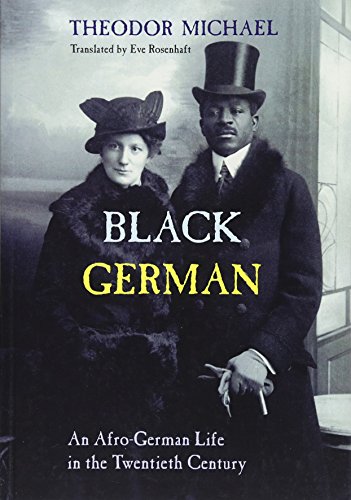
Black German: An Afro-German Life in the Twentieth Century
In his autobiography, Theodor Michael gives an impressive report of his turbulent life, which began in 1925 in Berlin. His book, which Eva Rosenhaft translated into English, reflects almost a whole century of German history from an important perspective that everyone, but especially Germans, needs to hear. The author, journalist, civil servant and actor died in Cologne in 2019 at the age of 94. He was an icon and a role model within the Black German community.
Michael’s mother, who died young, came from the village of Jersitz near Poznan. She was white. Her love for his Cameroonian father Theophilus Wonja Michael was a taboo subject in her family. Michael is unable to trace his paternal family history with any precision, but it seems certain that his father was in Germany from 1903 at the latest. He was supposed to be trained as a Christian priest in England, but fled to Germany. There he first worked for the Berlin underground railway construction company, later became an extra in silent movies, and then worked in what were called Völkerschauen, and today are understood as having been human zoos. At the beginning of the 20th century, white dominant society denied Black people equal access to the labour market and, unfortunately, joining shows, in which people constructed as “other” were exhibited, was often one of the few ways to earn money on a regular basis. For this job, he toured the whole country, taking his children with him until welfare services demanded they should have a ‘proper’ life. Since Michael’s mother had already passed away, he and his siblings were put into various foster families.
Michael was one of the last living Black witnesses of the Weimar Republic and National Socialism. He was torn out of his first foster family during the Nazi regime, which probably served to save him. In the following years, he toured with a circus beyond Germany’s borders in the company of Mohamed ben Ahmed. In this way, he followed in the footsteps of his father, who had passed away.
Michael survived the Nazis, but after the end of the war was suspected of collaboration for precisely this reason. At that time, he could never have imagined that he would one day work as a government director for the BND. From the 1980s onwards, Michael became involved in the Black German Community, which at that time was beginning to create structures for itself with the organisations ADEFRA (Black Women in Germany) and ISD (Initiative Schwarze Deutsche).
Although Michael’s life was marked by racism, he ends his memoir with hope. At the same time, he reminds readers that we all have to deal with still existing racist structures in order to change them. Michael’s autobiography should be required reading for everyone interested in Afro-German history.
Order the book here and support us! The work behind poco.lit. is done by us – Anna und Lucy. If you’d like to order this book and want to support us at the same time, you can do so from here and we will get a small commission – but the price you pay will be unaffected.

